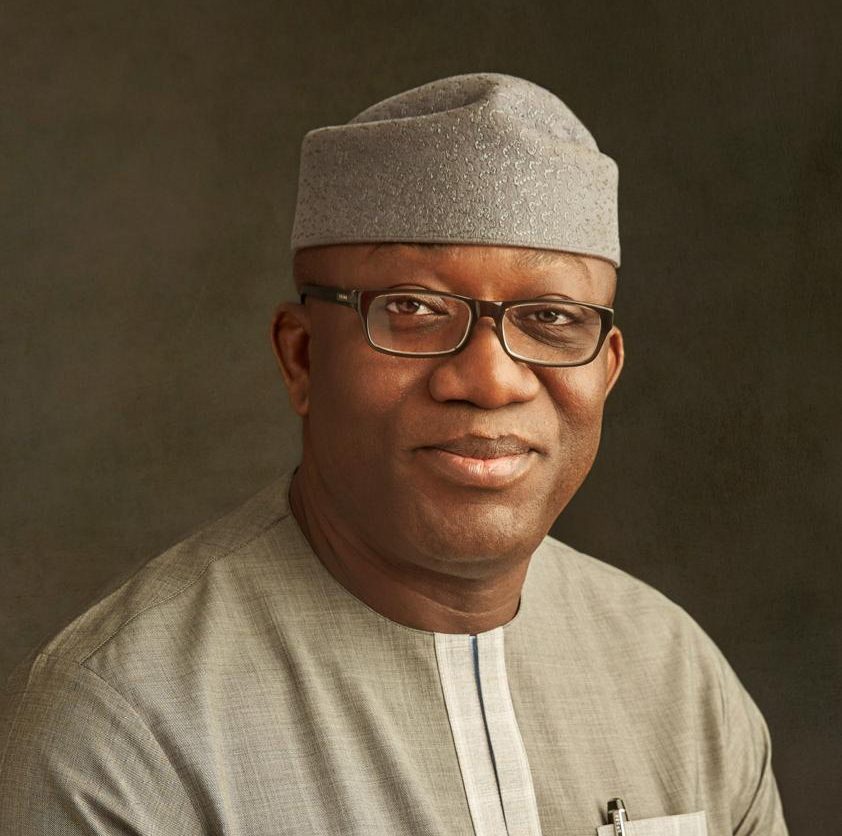Former Ekiti State Governor, Dr. Kayode Fayemi, has categorically denied reports linking him to the African Democratic Congress (ADC), describing ongoing rumours of his defection from the All Progressives Congress (APC) as “baseless, unfounded, and politically mischievous.”
The speculation gathered momentum after a viral conversation circulated on social and digital media, in which former Minister of Transportation, Rotimi Amaechi, allegedly claimed that he and Fayemi were central to forming the ADC coalition before later expanding it to include other political figures. The alleged comments, alongside Fayemi’s history of engaging in cross-party discussions, his repeated criticisms of the APC leadership, and his recent absence from the rally launching Governor Biodun Oyebanji’s second-term bid, fuelled heightened chatter within political circles.
However, Fayemi has moved swiftly to dispel the rumours. In a statement issued on Sunday by the head of Fayemi Media Office in Abuja, Ahmad Sajoh, the former governor emphasised his commitment to the APC and rejected any suggestion that he was part of the formation of the ADC or was considering leaving the ruling party.
Read Also:
Fayemi: Nigeria has civilian rule but not full democracy
Tinubu, Obi, Fayemi meet at Pope Leo XIV inauguration
Fayemi denies dumping APC
“Despite efforts to verify this statement, which has gained traction on social and digital media, we have found no credible evidence to support it,” Sajoh said. “No video of Hon. Amaechi making these claims or reports from reputable media organisations has been located.”
The media aide stressed that Dr. Fayemi remains a “committed member and leader” of the APC in Ekiti State, pointing to his public endorsement of Governor Oyebanji for re-election as evidence of his loyalty. According to Sajoh, Fayemi’s open support for the APC gubernatorial ticket contradicts any claim that he is working with, or for, an opposition party.
Political observers have noted that the rumours persisted in part because of Fayemi’s perceived limited visibility in Nigeria’s political space in recent months. His absence from high-profile state events, including the official launch of Oyebanji’s re-election bid, was seized upon by critics as proof of a potential political shift. However, Sajoh clarified that the reduced public appearances are the result of Fayemi’s ongoing engagements outside the country.
“Dr. Fayemi has been actively engaged as a visiting professor at King’s College London and as the founder of the Amandla Institute,” Sajoh explained. “These commitments have taken him out of the national spotlight temporarily, but they do not in any way signal political disengagement or disloyalty.”
Fayemi, widely regarded as a politician and thought leader with friends and associates across political, religious, ethnic, and regional lines, has often been involved in discussions about Nigeria’s democratic future, governance reforms, and solutions to the nation’s pressing challenges. Sajoh insisted that such broad national conversations should not be misinterpreted as moves towards defection.
“These conversations, however, do not amount to defections or leaving the APC,” Sajoh said. “Dr. Fayemi has the courage to pursue his convictions. If he were to leave the APC, he would make it public and not require a third party to do so.”
Sajoh further stressed that while political speculation may be unavoidable at the national level — particularly in an election season — such speculation holds no weight in Ekiti State, where Fayemi remains actively involved in APC affairs. “He has attended several APC leadership meetings in the state and continues to play a key role in shaping the party’s strategy for the forthcoming gubernatorial election,” Sajoh noted.
The statement also pointed out that Fayemi’s endorsement of Oyebanji is not merely symbolic but part of an ongoing commitment to ensuring the APC retains power in Ekiti. “His position is clear: he supports the APC and is invested in its continued leadership in the state,” Sajoh concluded.
As the 2025 election season intensifies, analysts say Fayemi’s strong public rebuttal may help stem the tide of rumours linking him to opposition movements. Nonetheless, the episode reflects a broader trend in Nigerian politics where absence from key events, cross-party dialogue, or even perceived dissatisfaction within party ranks can quickly fuel speculation about potential defections.
For Fayemi, a former Minister of Solid Minerals Development and two-term governor of Ekiti State, the challenge now may be less about clarifying his party affiliation and more about maintaining visibility in an increasingly crowded and volatile political space — both in Ekiti and at the national level.
His firm rebuttal, coupled with his continued public backing of Governor Oyebanji, suggests that for now, at least, Fayemi’s political home remains firmly with the APC.



